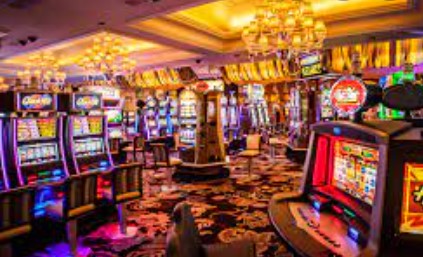I receive emails from “experts” every day wishing to sell me their system. They tell me how I can beat the slot machines. Some claim that I could make as much as $1,000 per day. Although I would love to earn $1,000 per day by playing the slots, they will only sell you useless information. You “could” make easily $1,000 per day. But, these con men know that you won’t. They are trying to avoid false advertising prosecution by using “could.” These ads are no more credible than if I advertised a book for $79.99.
“You might win a million dollars in tomorrow’s lottery drawing. So buy my book for $79.99 and find out how.”
You could fill my book with all sorts of interesting and useless information. I could tell you how to choose six numbers from a lotto card and keep my promise. But do you think my book, or my system, will help you win? You “could” win, with or without my book.
I have taught statistics and probability at a university. Both are against you every time you play the slot machines. Las Vegas is full of losers. They didn’t create those massive casinos to give out $1,000 per day.
Because I wanted to know more about these slot machine books, I challenged a few system experts to give me a free trial. In return for my testimonial, half of my first two winning days, and my testimony, they would send me their system if it failed. Isn’t this reasonable? If the system worked, I would send them a testimonial. And if I made $1,000 per day for two days, I would give them $1,000. It seemed reasonable that they only wanted $29.99 for their system. If it worked, I would be willing to pay $1,000. They weren’t gamblers, and they indeed weren’t con men. One of them didn’t even respond to my challenge. He said that his system was too valuable for him to waste his time doubting. This means that he had too many people lined up to purchase his scam to be at risk of me exposed.
These systems are based heavily on the belief that problem gamblers and gamblers believe that there is something that can give them an advantage. These “systems” are sold in the hope that the conman offering them it was once in their shoes and has made some discovery that is still elusive. Instead, they are preying on a weakness in human nature that the con men have only discovered.
The probability theory behind today’s slot machines is based on statistics. This means that the casino will always win in the long run. You can win, but you’ll lose if you play too long. If you could guarantee that you would win playing slots, both statistics and probability theory would favor the gambler. As a result, the casinos would shut down.
Slot machines are nothing more than computers that play a cycle of probabilities. You played when one of the probabilities resulted in a win. These probabilities are always smaller than the chance of you losing.
Next time you’re in a casino, take a look around. The casino spends several thousand dollars on every machine. Many casinos are expensive to build and require hundreds of workers to maintain them. Look at the ceiling, count the cameras and multiply that number by a few thousand dollars to determine how much security was invested. Take a look at the gorgeous tiled floors, lush carpets, and dining facilities. Then ask yourself if this low-life conman believes he has a system that will allow you to take $1,000 per day from the casino. You can also ask why he would offer it for $29.99 when you could sign contracts with others to work for him. These could be his employees using his “system” to earn $300 per day while he turns over $700 per day. He is offering his “system” for $29.99. He can’t consistently make money playing slots, so he needs your help to purchase his “system.”
Suppose you enjoy playing the slots and are willing to lose a few dollars for entertainment. You can play the places to enjoy the occasional win and to be able to lose over the long term. My experience is that scouting books and checking their value online is like playing the slot machines. However, it only takes me a few seconds when I find a loser, and I am always happy when my phone informs me that I have found one.
Venturing into the mesmerizing world of casinos, it’s vital to pierce the veil of allure surrounding slot machines and the seductive, yet illusory, promises of “winning systems.” Picture this: slot machines, with their sleek designs and hypnotic appeal, beckoning players with the glimmer of fleeting triumphs. Yet, hidden beneath this veneer of excitement lies a stark truth: casinos are not bastions of charity, but rather engines of profit, fine-tuned for financial gain.
Consider the slot machine – a true marvel of psychological and mathematical engineering. These machines are not mere random number generators; they are the puppeteers of hope, dispensing wins just often enough to keep the dream alive, all the while ensuring the casino’s coffers swell over time. The intricate dance of numbers and odds plays out in a way that, while offering the occasional windfall, typically ensures that players part with more than they pocket.
Now, let’s delve into a crucial aspect often misunderstood by many: every whirl of the slot machine’s reels is an entity unto itself. The past spins? Mere history. The odds of striking gold remain steadfast, unaffected by the ghosts of spins gone by. This stubborn truth is often a hard pill to swallow, leading many down the rabbit hole of so-called winning systems and strategies, fueled by a misguided belief in patterns where none exist.
These so-called systems are nothing but castles in the air. Slot machines, governed by the unyielding laws of Random Number Generators, mock the very idea of a predictable pattern. Every spin is a new story, untethered from the narratives that came before. The notion of a system that outsmarts these electronic fortunetellers is, quite simply, a fantasy.
But there’s more to these machines than cold numbers and random chance. Step into a casino, and you’re stepping onto a stage set with meticulous care: the dazzling lights, the symphony of coins and bells, all meticulously orchestrated to seduce, to promise untold riches. It’s a psychological siren song, complete with free drinks and labyrinthine layouts, all designed to keep you playing, dreaming, hoping.
In closing, let’s be clear: slot machines can be a whirlwind of fun and excitement, a harmless diversion in the grand tapestry of entertainment. But it’s essential to approach them with eyes wide open, recognizing them for what they are: a form of amusement, not a path to riches. The house, with its unassailable edge, will always come out on top. So, as you play, remember: enjoy the thrill, savor the moment, but never forget that in the grand scheme of casino gambling, the odds are etched in stone, and no system, no matter how clever, can alter that unchangeable truth.

